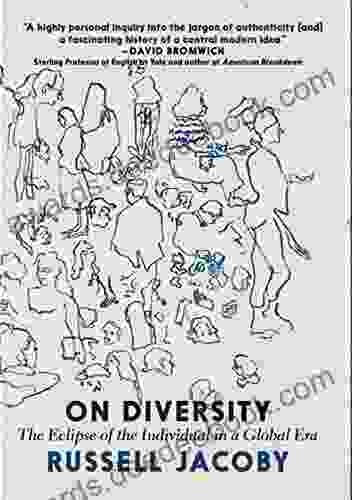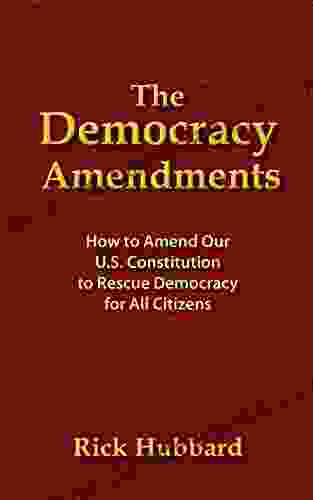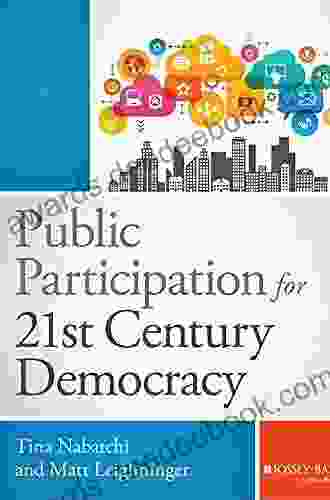Unleashing the Power of Public Participation for a 21st Century Democracy: Innovations from Bryson in Public and Nonprofit Management

In the rapidly evolving landscape of the 21st century, public participation has emerged as a cornerstone of vibrant and responsive democracies. The traditional model of representative democracy, where citizens delegate their decision-making authority to elected officials, is increasingly being complemented by a more participatory approach that engages citizens directly in the governance process.
4.8 out of 5
| Language | : | English |
| File size | : | 2324 KB |
| Text-to-Speech | : | Enabled |
| Screen Reader | : | Supported |
| Enhanced typesetting | : | Enabled |
| Print length | : | 342 pages |
| Lending | : | Enabled |
| X-Ray for textbooks | : | Enabled |
This paradigm shift has been driven by a growing recognition of the value of citizen input, the need for more inclusive and transparent decision-making, and the transformative power of collective action. As a result, public participation has become an essential element of effective public and nonprofit management.
Among the leading thinkers who have shaped our understanding of public participation is John M. Bryson, a renowned scholar in the field of public and nonprofit management. Bryson's work has provided a comprehensive framework for understanding the complexities of public participation and has offered innovative approaches to foster meaningful citizen engagement.
Bryson's Framework for Public Participation
Bryson's framework for public participation is based on the belief that effective participation requires a systematic and strategic approach. He argues that public participation should be viewed as a continuum, ranging from superficial consultation to deep collaboration, with each level requiring different levels of resources, skills, and commitment.
Bryson's framework identifies five key dimensions of public participation:
- Purpose: The clear definition of the purpose of public participation, whether it is to inform, consult, involve, collaborate, or empower.
- Scope: The extent to which the public is involved in the decision-making process, from providing input to making binding decisions.
- Representation: The degree to which the participants are representative of the broader community, ensuring diverse perspectives are considered.
- Process: The specific methods and techniques used to engage the public, such as public hearings, focus groups, or citizen juries.
- Resources: The financial, human, and technical resources available to support public participation efforts.
Innovative Approaches to Public Participation
Building on his framework, Bryson has developed a number of innovative approaches to public participation that have been widely adopted by public and nonprofit organizations.
One of the most significant innovations is the concept of "collaborative governance." Collaborative governance involves bringing together diverse stakeholders, including citizens, government agencies, businesses, and nonprofits, to work together on complex public issues. This approach recognizes that no single entity has all the answers and that collaboration is essential to developing effective and sustainable solutions.
Another innovative approach is "participatory budgeting." Participatory budgeting gives citizens direct control over a portion of the public budget, allowing them to make decisions about how to allocate resources in their communities. This approach has been shown to increase civic engagement, improve the quality of public spending, and reduce corruption.
Bryson has also emphasized the importance of "deliberative dialogue" as a tool for public participation. Deliberative dialogue is a structured process that brings together diverse perspectives to engage in respectful and informed discussion. This approach helps to build consensus, reduce polarization, and improve the quality of decision-making.
Case Studies in Public Participation
To illustrate the practical application of Bryson's ideas, let's explore a few case studies of successful public participation initiatives.
Case Study 1: The Participatory Budgeting Project in Porto Alegre, Brazil
The Participatory Budgeting Project in Porto Alegre, Brazil is a pioneering example of how public participation can transform the way cities are governed. Launched in 1989, the project gives citizens direct control over 15% of the city's annual budget. Through a series of public assemblies and neighborhood meetings, citizens identify and prioritize projects that they believe will benefit their communities. The project has been credited with improving the quality of life in Porto Alegre, reducing inequality, and fostering civic engagement.
Case Study 2: The Consensus Conference on Genetically Modified Crops in the United Kingdom
In 2003, the United Kingdom held a consensus conference on genetically modified crops. The conference brought together a diverse group of citizens, scientists, and policymakers to engage in a structured and informed discussion about the potential risks and benefits of GM crops. The conference helped to build public understanding of the issue, reduce polarization, and inform government policy.
Case Study 3: The Collaborative Governance Initiative in the Chesapeake Bay
The Chesapeake Bay Collaborative Governance Initiative is a multi-stakeholder partnership that brings together government agencies, businesses, nonprofits, and citizens to address the environmental challenges facing the Chesapeake Bay. The initiative has developed a comprehensive plan for restoring the Bay, which includes measures to reduce pollution, improve water quality, and protect fish and wildlife habitat. The initiative has been successful in fostering collaboration, building consensus, and securing funding for restoration efforts.
The ideas of John M. Bryson have profoundly shaped the field of public participation. His framework for public participation and his innovative approaches have provided a roadmap for public and nonprofit organizations to engage citizens in meaningful and effective ways.
As we navigate the challenges of the 21st century, public participation is more important than ever. By embracing the principles of collaboration, inclusivity, and transparency, we can unleash the transformative power of citizen engagement and build more vibrant, responsive, and just democracies.
4.8 out of 5
| Language | : | English |
| File size | : | 2324 KB |
| Text-to-Speech | : | Enabled |
| Screen Reader | : | Supported |
| Enhanced typesetting | : | Enabled |
| Print length | : | 342 pages |
| Lending | : | Enabled |
| X-Ray for textbooks | : | Enabled |
Do you want to contribute by writing guest posts on this blog?
Please contact us and send us a resume of previous articles that you have written.
 Book
Book Story
Story Genre
Genre Reader
Reader Magazine
Magazine Newspaper
Newspaper Paragraph
Paragraph Sentence
Sentence Bookmark
Bookmark Glossary
Glossary Bibliography
Bibliography Preface
Preface Codex
Codex Tome
Tome Classics
Classics Memoir
Memoir Reference
Reference Dictionary
Dictionary Thesaurus
Thesaurus Narrator
Narrator Character
Character Resolution
Resolution Librarian
Librarian Catalog
Catalog Card Catalog
Card Catalog Stacks
Stacks Archives
Archives Study
Study Research
Research Lending
Lending Reserve
Reserve Reading Room
Reading Room Rare Books
Rare Books Interlibrary
Interlibrary Literacy
Literacy Study Group
Study Group Awards
Awards Reading List
Reading List Book Club
Book Club Theory
Theory Patricia L Maclachlan
Patricia L Maclachlan Pierre Pouchairet
Pierre Pouchairet Sensei Paul David
Sensei Paul David Stephanie Rohr
Stephanie Rohr Gary Kowalski
Gary Kowalski Jean Stone
Jean Stone Allie C Kilpatrick
Allie C Kilpatrick Jonathan Tonge
Jonathan Tonge Francesco Bellocchio
Francesco Bellocchio Nick Spalding
Nick Spalding Gabrielle Weinman
Gabrielle Weinman Martin Kihn
Martin Kihn Brian Domitrovic
Brian Domitrovic Dennis Winegarner
Dennis Winegarner L C Kincaide
L C Kincaide Laura V Coulter
Laura V Coulter Tracy Adams
Tracy Adams Mark Fisher
Mark Fisher Bradford Torrey
Bradford Torrey Samantha Cruz
Samantha Cruz
Light bulbAdvertise smarter! Our strategic ad space ensures maximum exposure. Reserve your spot today!

 Cormac McCarthyUnveiling the Enchanting World of Short Stories and Coloring Pages: A Journey...
Cormac McCarthyUnveiling the Enchanting World of Short Stories and Coloring Pages: A Journey... J.R.R. TolkienFollow ·7k
J.R.R. TolkienFollow ·7k Javier BellFollow ·19.2k
Javier BellFollow ·19.2k Calvin FisherFollow ·3.2k
Calvin FisherFollow ·3.2k Larry ReedFollow ·7.1k
Larry ReedFollow ·7.1k John KeatsFollow ·4.6k
John KeatsFollow ·4.6k Ricky BellFollow ·17.4k
Ricky BellFollow ·17.4k Reed MitchellFollow ·12k
Reed MitchellFollow ·12k Hamilton BellFollow ·14.7k
Hamilton BellFollow ·14.7k

 Roger Turner
Roger TurnerThe Waning of the Individual in the Global Era: A...
In the rapidly globalizing world of today,...

 Reginald Cox
Reginald CoxFirst of Verbs: An Early Language
The First of Verbs (FOV) is an early...

 Cody Blair
Cody BlairThe Biography Of The Myth: Routledge Historical...
Who is the Myth?...

 Dean Cox
Dean CoxArtificial Neural Networks: Unraveling the Amazing...
Artificial Neural Networks (ANNs),...

 Kyle Powell
Kyle PowellHow To Amend Our Constitution To Rescue Democracy For All...
Our democracy is in...
4.8 out of 5
| Language | : | English |
| File size | : | 2324 KB |
| Text-to-Speech | : | Enabled |
| Screen Reader | : | Supported |
| Enhanced typesetting | : | Enabled |
| Print length | : | 342 pages |
| Lending | : | Enabled |
| X-Ray for textbooks | : | Enabled |












